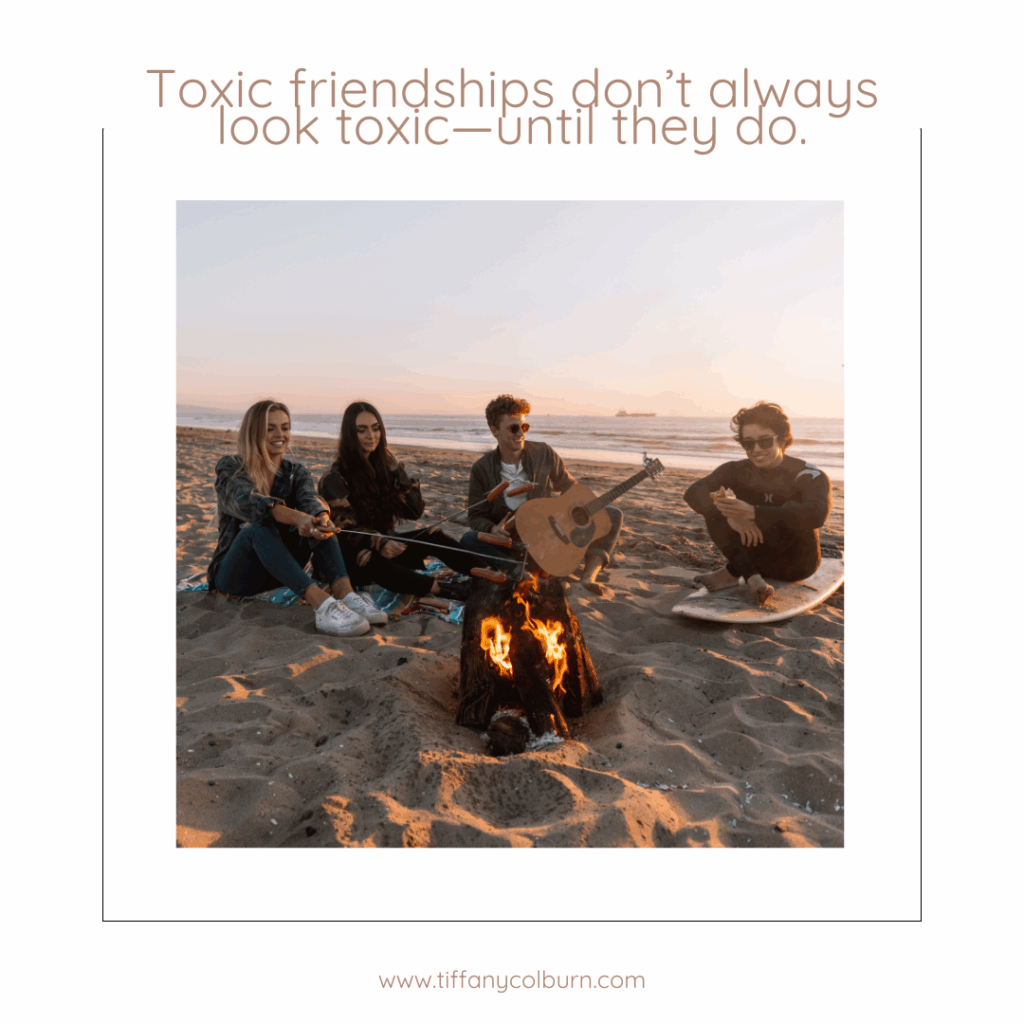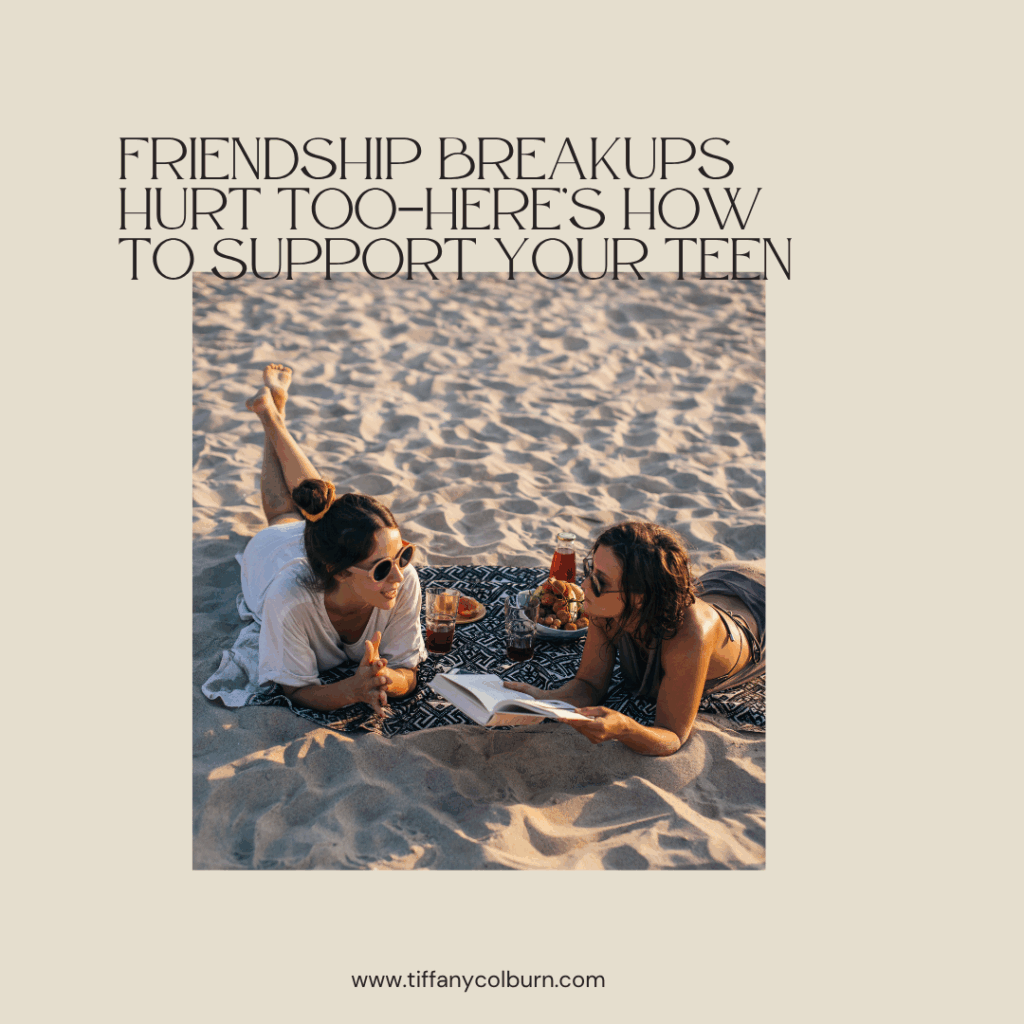Table of Contents Show
- For Teens: It’s Not Supposed to Hurt Like This
- Red Flags in Friendship (That Might Look a Lot Like Dating Red Flags)
- What Real Friendship Should Feel Like
- For Parents: When It’s Not Just ‘Teen Drama’
- What Actually Helped the Most
- Healing from a Toxic Teen Friendship
- Final Thoughts – Friend Breakups Hurt Too
- Helpful Resources for Teens and Parents
When Forever Falls Apart
Toxic teen friendship isn’t something we talk about enough, but it can leave behind some of the deepest emotional wounds.
She really thought this was her forever friend.
Her person.
Her safe place.
The one who’d always be there.
And then everything changed.
This past year, I watched my daughter go through one of the hardest things a teen or young adult can experience. Her freshman year college roommate quickly became her best friend. They were inseparable, practically the same person. Everything they did, they did together. They shared inside jokes, late-night snacks, and the kind of bond that felt unshakable.
But when they returned for their sophomore year, everything shifted. The closeness faded. The warmth disappeared. Plans happened without her. Conversations felt colder. And slowly, the person she trusted most started making her feel like she didn’t belong anymore.
It wasn’t just a falling-out. It was a loss. And it hurt in ways we didn’t expect.
Whether you’re a teen (or young adult) going through a toxic friendship or a parent watching it happen to your child, I hope this post helps you feel seen. Toxic teen friendships are more common than we realize. And when they fall apart, the pain is real.
For Teens: It’s Not Supposed to Hurt Like This
Sometimes the people who say “you’re my person” are the same ones who make you feel like you don’t matter anymore.
And it can be really confusing.
At first, you might not even realize what’s happening. Maybe they started pulling away. Maybe they only wanted to hang out when it was convenient. Maybe they were sweet one minute and cold the next, especially when other people were around.
One day, you’re laughing and studying together. The next, you’re walking to class alone and wondering what you did wrong. That emotional whiplash doesn’t just hurt, it messes with your confidence, your trust, and your sense of self.
You might be asking yourself:
- “Did I do something wrong?”
- “Am I just being dramatic?”
- “Why does this hurt so much?”
Here’s the truth: toxic teen friendship doesn’t always look obvious at first. But if a relationship is leaving you anxious, excluded, or like you have to constantly prove your worth, it’s not healthy.

Red Flags in Friendship (That Might Look a Lot Like Dating Red Flags)
We don’t talk about this enough, but toxic teen friendships can mirror toxic dating relationships in many ways. It’s not about the type of relationship, it’s about the pattern. And when someone makes you feel small, afraid, or invisible, that’s a sign something’s wrong.
Here are some red flags to watch for:
- They make jokes about you in front of others, but they’re not funny.
- You feel like you have to hide parts of yourself or walk on eggshells.
- They only talk to you when they need something.
- They act totally different in a group, ignoring you or trying to one-up you.
- You feel anxious before seeing them and drained afterward.
- They keep score of time, favors, loyalty, or mistakes.
- They guilt-trip you for hanging out with other people.
- You’re always re-reading texts or second-guessing what you said.
- They talk badly about others, and you wonder if they’re doing the same to you.
- They suddenly stop talking to you or freeze you out when they’re upset.
- They twist your words or act like things never happened, even when you know they did.
- You’re always the one apologizing, even when you don’t know what you did wrong.
- You find yourself defending them to everyone else… even though they’ve hurt you.
And here’s something important to know:
A lot of these red flags show up in toxic dating relationships, too. If you’re noticing these patterns in a toxic teen friendship, it’s not “just drama,” it’s a sign that something isn’t right. Learning to recognize the signs of a toxic teen friendship now helps you build safer, healthier relationships going forward.
Some of these patterns, especially isolation, guilt-tripping, and manipulation, can also show up in dating or family relationships. If any of this feels familiar, this post about isolation explains how abusers use distance and subtle control to wear down your confidence.
And if this isn’t the first time you’ve felt like this around someone, it’s okay to ask yourself: What does a safe relationship actually feel like?
What Real Friendship Should Feel Like
After experiencing a toxic teen friendship, it’s easy to lose sight of what a real, healthy friendship should feel like.
So here’s a reminder:
- You can be fully yourself, and they like you for it.
- They cheer for your wins instead of competing with them.
- You don’t feel like you’re constantly earning their approval.
- You can take space and still feel secure.
- They talk to you, not about you.
- You leave time together feeling lighter, not smaller.
- When something hurts, they listen and want to make it right.
Real friendship feels safe. It feels steady. And it doesn’t make you question your worth.
For Parents: When It’s Not Just ‘Teen Drama’
If you’re watching your child go through a toxic teen friendship, it can be heartbreaking and confusing. These friendships often start off close and intense, which makes the shift even more painful to navigate. You want to fix it. You want to tell them they’re better off. You want to make it all feel smaller.
When my daughter went through this, there were moments I felt helpless. I wanted to say, “You’ll find better friends,” or “She wasn’t good for you anyway.” But what she really needed from me was to just be there.
You might not understand all the details. You might not even like how your child is handling it. But your steady presence, the one that listens without fixing, makes all the difference.
What Actually Helped the Most
- Listening without trying to fix it
I didn’t need to have the right words. I just needed to be there, sitting next to her while she cried, while she processed, while she tried to make sense of it all. Quiet support went further than any advice I could’ve given.
- Asking gentle, open-ended questions
Not “What happened this time?” but “Do you want to talk about it?” or “Do you want help figuring out how to respond?” Just letting her know I was available, without pressure, made it easier for her to open up when she was ready.
- Helping her name what she was feeling
At first, she didn’t want to use the word “toxic.” She just knew something felt off. But once we talked about the patterns and how they kept showing up, it helped her stop blaming herself. She could finally say, “This isn’t what friendship is supposed to feel like.”
What Didn’t Help (Even Though I Meant Well)
- “You’ll make new friends.”
Maybe eventually, but that’s not what she needed to hear. Right then, she didn’t want different friends, she wanted her friend. The one who suddenly wasn’t there anymore.
- “I never liked her anyway.”
That just made her feel worse. It added shame on top of heartbreak, like she should’ve known better. It shut the conversation down when what she really needed was space to talk it out.
- “This won’t matter in a few years.”
Maybe not. But right now? It mattered so much. Dismissing it didn’t help, it just made her feel like she was overreacting.
Your teen is grieving. And even if the friendship wasn’t healthy, it still meant something. It still was something. Let them miss it. Let them feel it. You don’t have to rush them past the pain. Just be there while they move through it.
Healing from a Toxic Teen Friendship
Whether you’re the teen going through it or the parent walking alongside them, healing takes time. It’s not a straight line. Some days will feel freeing, and some will hit you out of nowhere. And that’s normal.
There’s no one-size-fits-all answer, but here are some things that helped us begin to move forward:
For Teens:
- Give yourself space
It’s okay to mute them, unfollow, or block them. That’s not being dramatic or mean, it’s giving yourself breathing room. You don’t owe anyone constant access to your life, especially if being connected keeps reopening the wound.
- You don’t need closure to heal
Sometimes the most painful thing is not knowing why. But even if you did get an explanation, it probably wouldn’t erase the hurt. You don’t need their words to validate your pain. You get to close the door for yourself.
- Let yourself grieve
Just because the friendship was unhealthy doesn’t mean there weren’t good moments. You’re allowed to miss the laughs, the inside jokes, the memories. Missing those things doesn’t mean you should go back—it just means you’re human.
- Find one safe person
You don’t need a big group. You just need one person who makes you feel steady, seen, and safe. That could be a friend, a sibling, a parent, a teacher, or even a counselor. Healing happens faster when you’re not doing it alone.
- You are not the problem
This one’s hard to believe at first. But how someone else treats you is not proof of your worth. Their silence, their coldness, their blame, that’s about them, not you. You don’t have to twist yourself into someone you’re not to be enough.
If you’re still struggling to make sense of it all, you’re not weak, and you’re not crazy. This blog post about the cycle of abuse might help you understand why it was so hard to walk away, even if it hurt.

For Parents:
- Keep checking in, even gently
They might brush you off. They might say they’re fine. But don’t stop showing up. A simple “I’m here if you want to talk,” over and over, builds trust. Sometimes it’s the quiet presence that means the most.
- Encourage healthy outlets
Healing often needs a place to land. Support them in finding something that helps them reconnect with who they are, writing, running, art, journaling, volunteering, faith practices, and music. It’s not about distraction, it’s about rebuilding identity and confidence.
- Watch for signs they’re stuck in the pain
Sadness is normal. But if they’re withdrawing completely, struggling to sleep, showing signs of hopelessness, or starting to believe they were the problem, you may want to gently suggest talking to someone trained to help. Therapy can make a big difference, especially when they’re too close to it to see clearly.
- Be the voice of truth
They may be doubting everything, including themselves. Be the steady reminder of what you know to be true about them: their kindness, their strength, their worth. Don’t assume they know. Say it out loud. They need to hear it more than you think.
Healing from a toxic teen friendship takes time, especially when the connection felt deep or long-lasting. The grief is real, and it deserves space.
Final Thoughts – Friend Breakups Hurt Too
We talk a lot about heartbreak in dating, but not enough about the pain of a toxic teen friendship, and honestly? That kind of loss can cut even deeper, especially when the person who once felt like home is suddenly the one making you feel small, ignored, or not enough
To the teen reading this:
You didn’t cause this. You’re not too much, too needy, or too sensitive. You’re allowed to grieve. You’re allowed to miss what was. And you’re absolutely allowed to walk away from people who don’t treat you well. Real friendship won’t make you question your worth.
To the parent:
You don’t have to fix it. You just have to be there. Stay steady. Keep showing up. Your calm presence means more than you know, especially when their world feels like it just fell apart.
And to both of you, just because a friendship ended doesn’t mean it was all bad. But sometimes, the ending is what clears the space for something better. Something healthier. Something that feels like peace.
If this spoke to you or reminded you of someone you love, I hope you’ll share it. These are the hard things no one talks about—but healing begins when we realize we’re not the only ones.
Helpful Resources for Teens and Parents
Looking for more support after a toxic teen friendship? These resources offer deeper insight and practical tools:
- Types of Abuse – Love Is RespectUnderstand the various forms of abuse, including emotional and verbal, to help identify unhealthy patterns in relationships.
- 15 Ways to Help Your Teen/Tween When a Friendship Suddenly Ends – Caroline MaguireOffers practical advice for parents to support their teens through the emotional turmoil of a friendship breakup.
- How to Identify and Inoculate a Toxic Friendship – Psychology TodayLearn about the signs of a toxic friendship and strategies to protect oneself from emotional harm.



